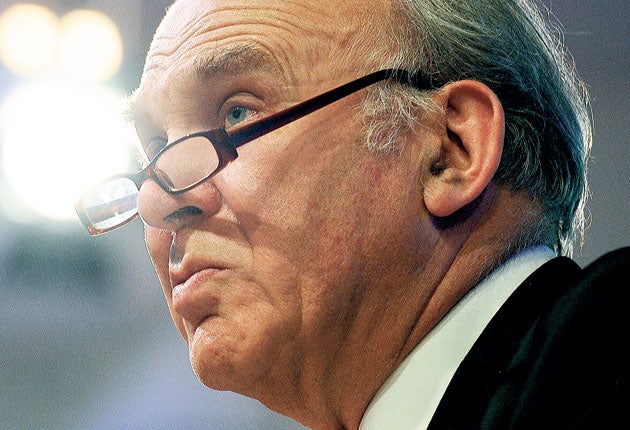Cable says he will force banks to lend to business
Sean O'Grady analyzes Vince Cable's message on the economy

Your support helps us to tell the story
From reproductive rights to climate change to Big Tech, The Independent is on the ground when the story is developing. Whether it's investigating the financials of Elon Musk's pro-Trump PAC or producing our latest documentary, 'The A Word', which shines a light on the American women fighting for reproductive rights, we know how important it is to parse out the facts from the messaging.
At such a critical moment in US history, we need reporters on the ground. Your donation allows us to keep sending journalists to speak to both sides of the story.
The Independent is trusted by Americans across the entire political spectrum. And unlike many other quality news outlets, we choose not to lock Americans out of our reporting and analysis with paywalls. We believe quality journalism should be available to everyone, paid for by those who can afford it.
Your support makes all the difference.In his first major speech as Business Secretary, Vince Cable has warned that the nation still faces a "very fragile" recovery, being held back by the crisis in the eurozone, the "massive" budget deficit and a "dysfunctional banking system".
Answering critics who claim that he is privately sceptical both about the coalition and Chancellor George Osborne's plans to reduce the deficit, Mr Cable denied that he was "some sort of socialist" attempting to frustrate the Treasury. Returning to a theme much used when he was in opposition, Mr Cable pledged to tackle "an economy that is seriously unbalanced both in its sectoral mix and in its regions".
The banks, said Mr Cable, would be forced to lend: "I will redouble our efforts to ensure that bank lending agreements from banks that have benefited from taxpayer subsidy are being honoured – especially for small and medium enterprises. We do not expect to see viable businesses deprived of credit or working capital by banks that are largely owned by the taxpayer, or the general beneficiaries of wider public support.
"The banks claim that there is no demand. That is not right. If the bar is set too high, of course no one is willing to jump. The current risk aversion by banks in the small and medium enterprise sector will stifle recovery and, if it does, will actually rebound on the banks through bad debt."
In an echo of the arguments about the timing of cuts that were aired during the election campaign, Mr Cable said he had now been persuaded of the need for immediate cuts, but still stressed the dangers of slashing too much too quickly, hinting at arguments going on within the Government. And while pushing his department as "the Department for Economic Growth", he was careful not to challenge the Treasury's authority directly: "It is, in any event, a major economic department, complementary to the Treasury. A key measure of the success of this Government is that both succeed. We cannot have sustainable growth without fiscal stabilisation. And fiscal stabilisation will only be successful if it leads to growth.
"There is a critically important issue of timing. There is a balance of risk. If deficit reduction comes too rapidly there is a danger of deeper recession and even bigger deficits. But like the Governor of the Bank of England, and like the OECD, I have been persuaded that early action on the deficit is essential. Going forward, policy must be driven always by the same rational calculation of economic risk and benefit."
For those with long memories Mr Cable's idea of a "Department for Economic Growth" has uncanny resonance with the "Department for Economic Affairs", a failed experiment to boost UK growth rates made by the Wilson government in the 1960s. It failed, not least because of Treasury hostility.
Mr Cable had earlier told the BBC Today programme that he enjoyed a "good working relationship" with the Chancellor, who is currently having talks in Beijing on his way to a G20 summit in South Korea.
The Business Secretary did not, though, address two of the thorniest and most immediate issues facing the coalition – capital gains tax and corporation tax reform. The Government's plans for these, which have attracted the attention of dissident Tory backbenchers, will be set out in the emergency Budget on June 22. Nor did Mr Cable add more detail on how his department will implement the £836m of cuts announced last week. Possible victims of retrenchment include the £270m loan guarantee offered to Vauxhall and an £80m loan to Sheffield Forgemasters, both approved by Mr Cable's predecessor, Lord Mandelson.
The Government's commitment to "green growth" was stressed by Mr Cable, however, so the various electric vehicle pilot schemes and a £20m loan to Nissan to develop and produce the "Leaf" electric car in Sunderland may be more secure.
Returning to unfinished business from previous Labour and Conservative governments, the Business Secretary confirmed that he would seek to "resolve the nagging problem of the Royal Mail" with more private sector involvement and a worker share ownership scheme.
Mr Cable's agenda
* Wants to lead "Department for Economic Growth"
* Will make banks honour agreements to lend to business
* Levy on the banks to pay for taxpayer guarantee
* Commission on breaking up the banks
* Part privatisation of the Royal Mail
* Tighten takeover rules
* £200m for Further Education colleges
* 50,000 more apprenticeships
* Cutting the £20bn cost of new regulations
* Abolition of more quangos
* Audit of state support for business, skills and colleges
Join our commenting forum
Join thought-provoking conversations, follow other Independent readers and see their replies
Comments